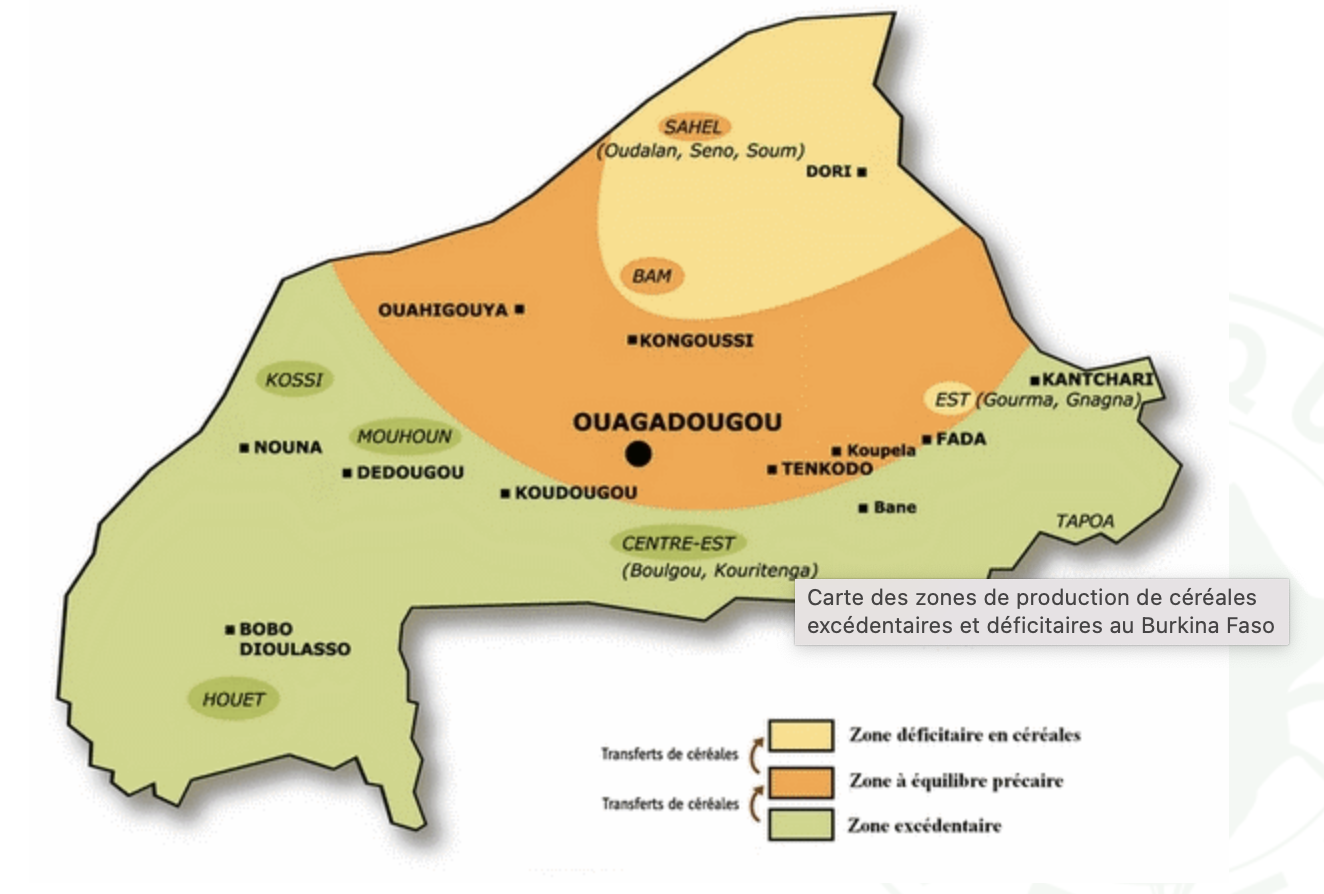Restoring Food Security: The Efforts of APROSSA in Burkina Faso
Editor’s note: Save the Children International warns that 1.4 million children in Burkina Faso will face critical levels of hunger this summer, a crisis forged from years of armed conflict and climate change in this Sub-Saharan nation, where temperatures are rising faster than the global average. The International Rescue Committee reports that weak rainfall last year is expected to reduce crop yields and pasture available for livestock. Armed groups have set up blockades around major cities and towns across the country, disrupting trade, farming, and access to vital services for over a million people.

APROSSA: Burkinabe woman’s Association for Burkina Faso
Against this dire backdrop, ESRAG’s West Africa correspondent, who lives in Burkina Faso, reports on how a Burkinabé NGO is working to restore national food security. The Association for the Promotion of Food Security and Food Sovereignty in Burkina (APROSSA – Afrique Verte Burkina) was established in 2005 as an autonomous organization following the empowerment of the Burkinabé branch of the French NGO Afrique Verte, which has been present in Burkina Faso since 1991. APROSSA’s mission is to improve food security for the population in a sustainable manner by professionalizing the cereal sector.
APROSSA provides support to more than 1,500 peasant agricultural production organizations organized into cooperatives or Cooperative Unions. Furthermore, it collaborates with over 300 processing units led by women, forming a national network.
APROSSA’s Comprehensive Plan for Food Security and Economic Empowerment
Facilitating the organization and structuring of peasant unions and federations. This collaborative approach enhances coordination and ensures better distribution of agricultural products at the national level.
Providing technical and commercial training to enhance the skills of peasant leaders. This includes technical knowledge related to agriculture and commercial expertise for effective management and marketing of surplus stocks from agricultural regions to deficit areas.
Literacy sessions, empowering participants with essential reading and writing skills. Literacy is crucial for informed decision-making and effective communication.
Advice and credit services to improve the commercialization of agricultural products. This helps farmers access markets and financial resources more efficiently.
Organizing annual cereal markets (bourses aux céréales), facilitating exchanges among producers, traders, and consumers. These markets contribute to food security by ensuring a steady supply of quality local cereals.
Assisting small women-led cereal transformation enterprises. These units play a vital role in supplying quality cereal products to urban centres, thereby enhancing food security in cities.
Promoting knowledge sharing among different peasant organizations (inter-OP) through exchange visits. This fosters learning, innovation, and best practices.
Providing information on cereal prices and availability, helping farmers make informed decisions and optimize their marketing strategies.
The association collaborates with farmers organized within peasant organizations,” says Philippe Ki, Coordinator of APROSSA’s technical assistance team. ” Given the crucial role of women in family nutrition and their quality as ‘good managers,’ they receive special attention and represent 35% of the network. They are the primary beneficiaries of the literacy program, which enhances their ability to manage marketing activities. Female peasant organizations supported by APROSSA – Afrique Verte Burkina are increasing in number, and in addition to these, there are female processing units in urban and peri-urban areas of Ouagadougou and Bobo-Dioulasso.
Some projects and partner NGOs also benefit from actions through training provided to their target audience and the dissemination of information on cereal prices and availability. APROSSA – Afrique Verte Burkina shares its analyses on the evolution of the campaign, prices, and cereal market indicators with these structures.
The association’s network also includes about fifteen cereal traders who develop close relationships with producers and their organizations. During tender processes, these traders partner with Regional Unions to supply cereal stocks. Their dynamism acts as a catalyst for initiative-taking by the Peasant Organizations (OP) and influences transaction volumes.”

Loading trucks for grain transport
Empowering Local Leadership: APROSSA’s Governance and Collaborative Efforts
APROSSA is governed by a Burkinabé board of directors, which includes representatives of beneficiaries. The Board of Directors led by Pierre Bangou and the technical team led by Philippe KI are all composed of Burkinabe professionals. The NGO’s many technical and financial partners include the UN’s Food and Agriculture Organization (FAO), national and regional directorates, the French Development Agency (AFD), Oxfam, the European Commission, and credit unions and microfinance organizations across Burkina Faso.
On the ground, field trainers are based in the Regional Information Centers (CRI) of the association, working closely with peasant organizations and cereal processors. Afrique Verte collaborates closely with APROSSA in its efforts to enhance food security and sovereignty in Burkina Faso.

Millet farmer in Burkina Faso
The technical assistance fits specific regional needs and opportunities such as the unique challenges related to climate, soil, and water availability in Burkina Faso’s Sahel region. APROSSA is involved in supporting cereal processing activities in several cities of Burkina Faso, including Ouagadougou, Bobo-Dioulasso, and Banfora. These urban centres are major consumers of local agricultural products. Agro-food processing increases the added value and income of agricultural producers. Also in Ouagadougou and Bobo-Dioulasso, APROSSA supports access to technology for micro, small, and medium-sized enterprises.
APROSSA’s experience and Burkinabé leadership illustrate the implementation capacity which an in-country NGO offers to Rotary humanitarian projects. “It is entirely possible for a Rotary district to take an interest in and support a particular activity, a training session, a cooperative, or a region that suits them,” says Ki. “We can collaborate for the concerted targeting of the activity or the area that the Rotary wishes to support.” To reach out to APROSSA, visit the website.
Photos and map: APROSSA. The map shows Burkina Faso’s zones of grain shortage (yellow, in the Sahel), precarious equilibrium (orange), and surplus (green).
To learn more about ESRAG’s projects on Food Systems, click HERE.

